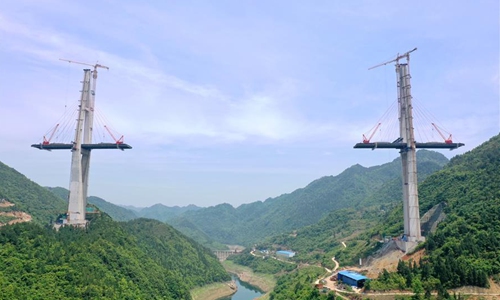China, Russia maintain firm ties for future cooperation
By Li Xin Source:Global Times Published: 2020/4/27 18:53:41

Aerial photo taken on April 26, 2020 shows the construction site of the Xiangjiang bridge in southwest China's Guizhou Province. With strict COVID-19 prevention and control measures in place, construction work of the 1,700-meter bridge has been resumed recently. (Xinhua/Liu Xu)
China and Russia have maintained a firm and long-term cooperative relationship, with many joint projects promoted under the framework of the Belt and Road Initiative (BRI). Though the bilateral trade will inevitably be impacted by the pandemic, the two nations have favorable cooperative prospects as the world seeks an economic recovery following the fallout from the virus.
BRI projects have been promoted smoothly in Russia and Central Asian countries and regions. The large-scale Yamal liquefied natural gas (LNG) project in the Arctic was led by Russia and China, and many other huge cooperation projects have been accelerated by the BRI framework.
Anti-globalization arguments have arisen recently, but the division of labor among countries and other aspects of globalization cannot be reversed. Though economic entities have chosen to contract cooperation in a bid to contain the virus, these were mainly short-term measures resulting from virus prevention needs.
It is understandable that some countries and regions have chosen to close their borders or suspend certain exports under measures to contain the coronavirus or enhance domestic supply - as is the case with Russia, which recently announced a suspension of soybean exports. China and Russia have seen an increased trade volume in recent years, which will inevitably be impacted by the pandemic and the following global economic contraction.
Ceasing grain trading is not encouraged under globalization as many countries lack arable lands and rely on food imports to feed their people. However, neither Russia's recent export suspension nor any of its other measures will have a significant impact on China-Russia relations as China is capable of maintaining its own grain supply, and such measures are not long-term policies.
The world will later see an economic recovery as countries grapple to offset the negative impact of the pandemic. Against the backdrop of increased demand post-pandemic, China and Russia will see an acceleration in economic cooperation under the BRI framework.
The two countries maintain mutual political trust, which has set a solid foundation for further expansion in cooperation.
There are many other projects under discussion between China and Russia despite the pandemic, including electric power projects and later phases of Yamal LNG projects which will be closer to the North Pole. New natural gas transportation projects are also being considered now that the China-Russia east-route natural gas pipeline project has steadily begun operations.
Mongolia has initiated a Steppe Route program which includes cooperative projects to build high-speed roads, power transmission lines and oil pipelines. The program is in line with BRI prospects and will promote cooperation with Russia and China.
Russia has recently seen its coronavirus situation worsen, with case numbers mounting and fear increasing that its curve may not flatten until May. China, with its outbreak largely under control, has offered help to Russia by supplying medical materials among other things. To cooperate further in virus prevention, China could also send medical expert teams to Russia to offer assistance.
Virus containment is not limited to one or two countries. Other countries and regions, including those in Central Asia, also need to join hands to fight the world's common enemy.
The author is director of Europe and Asia research institute under the China National Institute for SCO International Exchange and Judicial Cooperation. Bizopinion@globaltime.com.cn